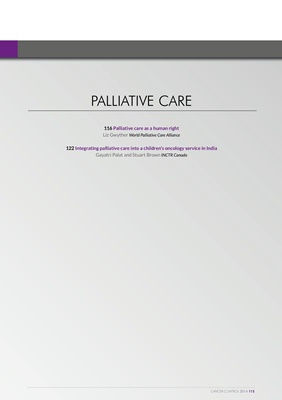
T
hrough active advocacy efforts and practical models of
provision of palliative care, it has been recognized that
palliative care is an appropriate and compassionate
response to the needs of patients with life-threatening
illnesses. This is true for cancer patients and for those with
other chronic progressive illnesses. However, there are
significant inequities in the provision of palliative care
worldwide. The Worldwide Palliative Care Alliance reports
that in 2011, only 136 of the world's 234 countries (58%) had
one or more hospice-palliative care services.1 In 2011, there
was no known palliative care activity in 78 of the world's 234
countries (33%). Twenty-three countries had some capacitybuilding potential for palliative
care. Ninety-one countries
reported localized hospice-palliative care provision. Twentyfive
countries reported that palliative care is approaching
integration with mainstream health service providers, but
only 20 countries (8.5%) have achieved this integration.
This inequity and significant gap in provision of palliative
care has led the international palliative care community to
develop strategies to improve access to quality palliative care
using a human rights approach to urge states who are
signatories to the International Covenant for Economic,
Social and Cultural Rights (ICESCR) to meet human rights
core obligations for the provision of palliative care in their
countries.2 There are a number of key statements that urge
governments to integrate palliative care into health systems,
the most recent being the Prague Charter which makes the
statement that: "Access to palliative care is a human right
under the right to the highest attainable standard of physical
and mental health".3 However, although it seems clear that
from a moral and compassionate standpoint that palliative
care should be recognized as a human right, it is necessary to
identify the legal foundation for this claim through the
documents of the United Nations General Assembly. It is one
thing to name something such as palliative care as a human
right but in order for it to be legally considered a human right
there has to be a process to establish this claim. There are
nine international human rights treaties4 (Table 1). The right
to health is described within the International Covenant for
Economic, Social and Cultural Rights. Each human rights
treaty body is a committee of international experts to
monitor the implementation of the core international human
rights treaties. The Committee for Economic, Social and
Cultural Rights monitors the implementation of the ICESCR.
The human rights treaty bodies publish interpretation and
guidance with respect to the international treaties as general
comments. General comments are not international laws but
are used by courts to interpret matters with regard to the
treaty, such as ICESCR for matters regarding health.
What are human rights?
The Office of the United Nations High Commissioner for
Human Rights states that human rights are "rights inherent
to all human beings, whatever our nationality… without
discrimination".5 The Preamble to the Universal Declaration
of Human Rights (UDHR) adopted on 10 December 1948 by
the United Nations General Assembly declares that
"recognition of the inherent dignity and of the equal and
inalienable rights of all members of the human family is the
foundation of freedom, justice and peace in the world".6
Article 25 of the UHDR addresses "the right to a standard of
living adequate for the health and well-being … and the right
to security in the event of unemployment, sickness, disability,
widowhood, old age".
The UHDR, the International Covenant for Civil and
Political Rights and the International Covenant for Economic,
Social and Cultural Rights, together known as the Bill of
Rights, were developed before modern hospices were
established and before palliative care was developed as a
discipline. However there have been a number of more recent
documents that do address palliative care as a human right.
The right to health is addressed within the ICESCR and in
PALLIATIVE CARE
AS A HUMAN RIGHT
LIZ GWYTHER, TRUSTEE, WORLDWIDE PALLIATIVE CARE ALLIANCE,
UNIVERSITY OF CAPE TOWN, SOUTH AFRICA
The right to palliative care is enshrined in many documents and agreements. This article explains
how human rights relate to palliative care and where to find the relevant information, as well as
the need to remove barriers and integrate palliative care into health care.
PALLIATIVE CARE
116 CANCER CONTROL 2014